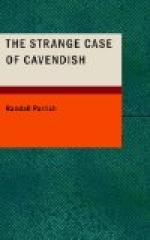Calling a page boy, he asked that Enright be located if possible. During the ensuing wait he outlined on a scrap of paper what he proposed doing. Fifteen minutes passed before Enright, suave and apparently young except for growing baldness, appeared.
“I take it you are Mr. Cavendish,” he said, advancing, “and that you are in immediate need of an attorney’s counsel.”
Cavendish nodded, shook hands, and motioned him into a chair. “I have been called suddenly out of town, Mr. Enright,” he explained, “and for certain reasons which need not be disclosed I deem it necessary to execute a will. I am the only son of the late William Huntington Cavendish; also his sole heir, and in the event of my death without a will, the property would descend to my only known relative, a cousin.”
“His name?” Mr. Enright asked.
“John Cavendish.”
The lawyer nodded. Of young Cavendish he evidently knew.
“Because of his dissolute habits I have decided to dispose of a large portion of my estate elsewhere in case of my early death. I have here a rough draft of what I want done.” He showed the paper. “All that I require is that it be transposed into legal form.”
Enright took the paper and read it carefully. The bulk of the $1,000,000 Cavendish estate was willed to charitable organisations, and a small allowance, a mere pittance, was provided for John Cavendish. After a few inquiries the attorney said sharply: “You want this transcribed immediately?”
Cavendish nodded.
“Since it can be made brief I may possibly be able to do it on the girl’s machine in the office. You do not mind waiting a moment?”
Cavendish shook his head, and rising, the attorney disappeared in the direction of the office. Cavendish heaved a sigh of relief; now he was free, absolutely free, to do as he chose. His disappearance would mean nothing to his small circle of casual friends, and when he was settled elsewhere he could notify the only two men who were concerned with his whereabouts—his valet, Valois, and the agent handling the estate. He thought of beginning a letter to John, but hesitated, and when Enright returned he found him with pen in hand.
“A trifling task,” the attorney smiled easily. “All ready for your signature, too. You sign there, the second line. But wait—we must have witnesses.”
Simms, the butler, and the doorman were called in and wrote their names to the document and then withdrew, after which Enright began folding it carefully.
“I presume you leave this in my care?” he asked shortly.
Cavendish shook his head: “I think not. I prefer holding it myself in case it is needed suddenly. I shall keep my rooms, and my man Valois will remain there indefinitely. Now as to your charges.”
A nominal sum was named and paid, after which Cavendish rose, picked up his hat and stick and turned to Enright.




